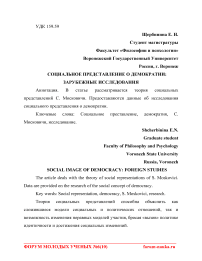Социальное представление о демократии: зарубежные исследования
Автор: Щербинина Е.Н.
Журнал: Форум молодых ученых @forum-nauka
Статья в выпуске: 6 (10), 2017 года.
Бесплатный доступ
В статье рассматривается теория социальных представлений С. Московичи. Предоставляются данные об исследования социального представления о демократии.
Социальное преставление, демократия, с. московичи, исследование
Короткий адрес: https://sciup.org/140279028
IDR: 140279028
Список литературы Социальное представление о демократии: зарубежные исследования
- Andreouli, Eleni and Howarth, Caroline. (2012). National identity, citizenship and immigration: putting identity in context. Journal for the Theory of Social Behaviour 43:3. 361-382.
- Castro, Paula. (2012). Legal Innovation for social change: Exploring change and resistance to different types of sustainability laws. Political Psychology 33:1. 105-121.
- Colucci, P. Camussi, E.(1996), Representations, politics and democracy: ideal vision and evaluations of political reality in Italy.
- Diamandouros, N., (1983), Greek political Culture in Transition, in Clogg R., ed. Greece in the 80s, MacMillan.
- Doise, W., Clémence, A., (1996), La problématique des droits humains et la psychologie sociale. Connexions 67.
- Farr, Robert. (1987). Social Representations: A French Tradition of Research. Journal for the Theory of Social Behaviour, 17:4. 343-369.
- Frangoudaki A., Dragonas T., (1997), Greece between tradition and modernity, in search of an equal place in the European taxonomy of peoples. In M. Angvik, B. Von Borries (Eds), Youth and History, Hamburg: Korber-Stiftung.
- Howarth, Caroline. (2006). A social representation is not a quiet thing: Exploring the critical potential of social representations theory. British Journal of Social Psychology 45. 65 - 86.
- Jovchelovitch, Sandra. (2007). Knowledge in Context. Representations, Community and Culture. New York: Routledge.
- Magioglou, T. (2003). Social representations of democracy; Ideal versus reality. Paper presenterat vid "The 1st LSE PhD Symposium on Modern Greece: 'Current Social Science Research on Greece", LSE, 21 juni, 2003. Hämtat 2006-11-16 från http://www.lse.ac.uk/collections/hellenicobservatory/pdf/symposiumpapersonline
- Marková, I. (2001). Dialogical perspectives of democracy as social representations. Critical Studies, Vol. 16, "Language - Meaning - Social Construction" (C. B. Grant & D. McLaughlin, red.), 125-139.
- Marková, I., Moodie, E. & Plichotvá, J. (2000). Democracy as a social representation. I M. Chaib & B. Orfali (red.), Social representations and communicative processes. Jönköping University Press.
- Moscovici, Serge. (1976). La psychanalyse, son image et son public (2. e´d. entie`rement refondue. ed.). Paris: Presses universitaires de France.
- Moscovici, Serge. (1988). Notes Towards a Description of Social Representations. European Journal of Social Psychology18. 211-250.
- Moscovici, Serge. (1998). The history and actuality of social representations. In Uwe Flick (Ed.), The psychology of the social. Cambridge: Cambridge University Press.
- O’Connor, Cliodhna, Rees, Geraint and Joffe, Helene. (2012). Neuroscience in the Public Sphere. Neuron 74:2. 220-226.
- Psaltis, Charis. and Duveen, Gerald. (2007). Conservation and conversation types: Forms of recognition and cognitive development, British Journal of Developmental Psychology 25. 79-102.
- Rose, Diana S. (1996). Representations of madness on British television: a social psychological analysis. Unpublished PhD thesis. University of London, London.
Статья научная


